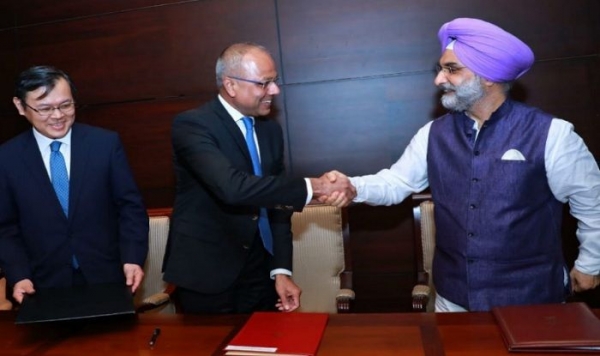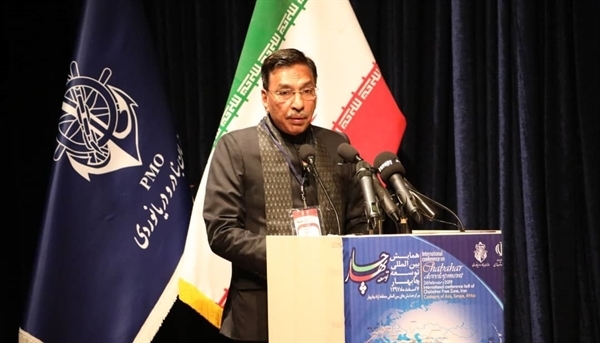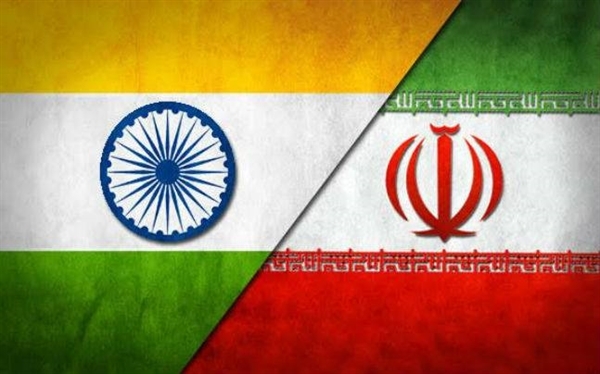News
Latest news
Sri Lanka, Japan, India to Jointly Develop Colombo South Port
Sri Lanka, Japan, and India have reached an agreement to cooperate on the development of Colombo South Port’s East Container Terminal (ECT) in Sri Lanka.
The governments of the respective countries signed a Memorandum of Cooperation (MoC) on the matter on May 28, reflecting the longstanding good will and cooperation among the parties.
Japan has provided cooperation for the development of the Jaya Container Terminal since the 1980’s, while around 70% of Colombo Port’s transshipment business is India-related.
Sri Lanka, Japan and India will work together for further development of the Colombo Port and contribute to further regional prosperity and stability of global trading networks.
Sri Lanka Ports Authority (SLPA) retains 100% ownership of East Container Terminal. The Terminal Operations Company (TOC) conducting all East Container Terminal operations is jointly owned by Sri Lanka, with a 51% stake, and the joint venture partners with a 49% stake.
SLPA said that the three governments would work out details based on the MOC at joint working group meetings, and advance their cooperation towards early commencement of work and operation of the ECT.
Reference:worldmaritimenews.com
India's link to Afghanistan will certainly be via Chabahar port
India’s deputy minister of transport said on Tue. that Chabahar port will be considered as India’s sole connecting point for the development of Afghanistan.
He made the remark in the 1st International Conference on the Development of Chabahar Port in Sistan and Baluchestan province.He reiterated that the Indian trade and business delegation is the largest foreign delegation taking part at the conference.
The Indian deputy minister pointed to the history of economic and cultural cooperation between the two countries, adding “our bilateral business and trade ties date back to many years ago. Iranian and Indian people have traditionally traded with one another from long time ago.”
He then pointed to the significance of Chabahar port for India’s trade with Afghanistan and said, “presently, a major portion of India’s economic exchanges are done via Chabahar port, and we have considered Chabahar port to ship products to neighboring Afghanistan.”Afghanistan’s first cargo of products was shipped to India’s Bombay port via Chabahar port, he added.
Turning to the significance of completion of Chabahar-Zahedan railway for boosting India’s trade exchanges with Afghanistan and the need to complete infrastructures in Chabahar port, he said, “once the construction operation of Qazvin-Rasht-Astara Railway is put into operation, it can be used as two connecting corridors of India with the Central Asia and Caucasus.”
Reference: pmo.ir
Chabahar port critical to Delhi's Eurasia strategy & connectivity initiatives in Indo-Pacific region
Chabahar will be key element in India's Indo-Pacific strategy that also includes Eurasia's connect with Indian Ocean Region
NEW DELHI: It was culmination of years of efforts when India Ports Global Limited Company opened its office in Chabahar and started the operations at the Shaheed Behesti port at the Iranian city, a step that would take Delhi closer to effective connectivity link to Afghanistan, Central Asia and parts of Russia.
Iran is key link to INSTC that connects Russia to India in shortest possible time. Kazakhstan plans to connect Gujarat via Iran and Russia is looking to put in place a connectivity corridor involving India and Oman through Iran. Chabahar will be key element in India's Indo-Pacific strategy that also includes Eurasia's connect with Indian Ocean Region. Chabahar is key element in Delhi's SCO membership and a pillar of India's connectivity projects amid China's BRI. European countries and Japan are poised to complement India's efforts in Chabahar port.
"We are also seeking to develop the Chabahar Port as a gateway for onward connectivity to and from Afghanistan and Central Asia. Since last year, we have shipped about 110 thousand metric tons of much-needed wheat and 2000 metric tons of pulses from India to Afghanistan through this Port. To tap its full potential for benefit of Afghanistan, we might also need to pursue the development of a rail line from Chabahar to Zahedan at some future stage," Foreign Secretary Vijay Gokhale said at a conference early November.
India signed a short-term lease, as part of the agreement signed during the visit of Iranian President Hassan Rouhani in February, to start interim operations for the Port. Delhi has committed $500 million for Chabahar Port complex besides $ 235 million for port expansion project. Delhi will also build 500-km-rail link between Chabahar and Zahedan in Iran which will then be extended to Zaranj in Afghanistan.
The Modi government maintains that once functional, the Chabahar Port will serve as a "growth engine" to India, Iran, Afghanistan and several Central Asian countries. Chabahar is India’s most viable gateway to Afghanistan and Central Asia with Pakistan denying India any land access to Afghanistan. Central Asian powerhouses – Uzbekistan and Kazakhstan – also view Chabahar Port as their gateway to the Indian Ocean Region. Officials here are of opinion that located some 1,000 km from Kandla and 1,400 km from Mumbai, the Chabahar port will ease sea route access for cargo, trade and business.
The first meeting of the Follow-up Committee for implementation of the trilateral Chabahar Agreement between India, Afghanistan and Iran at the level of Joint Secretary/Director General was held on December 24 in the port city of Chabahar.
Positive and constructive discussions were held between the three sides on full operationalization of the Trilateral Transit Agreement for international transit & transport through the Chabahar Port. They agreed on the routes for the trade and transit corridors between the three countries, according to an MEA statement.
The three sides agreed to finalize at the earliest the Protocol to harmonize transit, roads, customs and consular matters. It was agreed to allow cargo movement at Chabahar using TIR Convention provisions.
It was decided to hold an event to promote and popularize the potential of Chabahar on February 26, 2019. Also, a study would be initiated to determine measures to make the route attractive, decrease logistic costs and pave the way for smooth operationalization of the Chabahar Agreement.






















